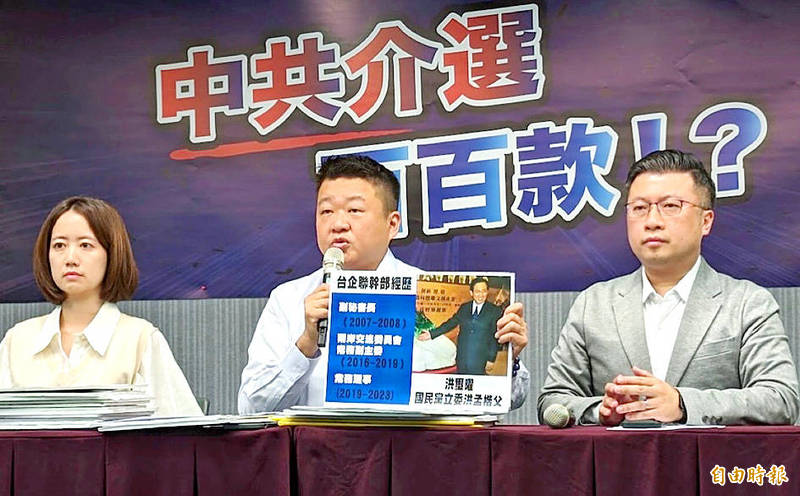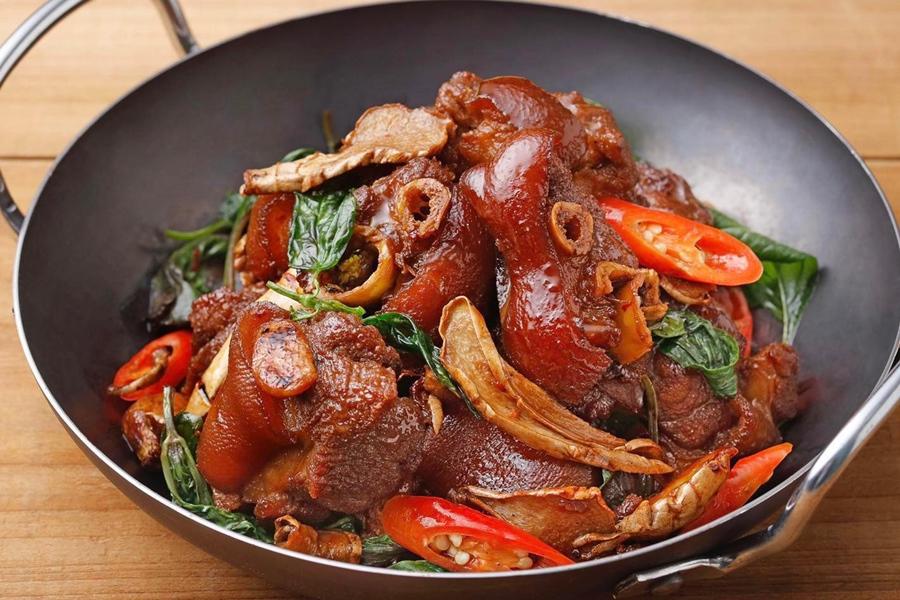《TAIPEI TIMES》 CCP seeks to influence election: DPP

From left, Democratic Progressive Party (DPP) presidential candidate William Lai’s campaign spokeswoman Tai Wei-shan, DPP legislative candidate Ho Po-wen and DPP spokesman Chang Chih-hao hold a news conference in Taipei yesterday. Photo: Chen Yun, Taipei Times
PRESSURE POINTS: Beijing often targets Taiwanese businesspeople to help sway the outcome of elections through intimidation or sometimes banquets, a DPP official said
Staff reporters / By Chen Yun and Jason Pan
China is leveraging its influence “in hundreds of ways,” including by falsifying poll results, pressuring the business community and enlisting online influencers, to help China-friendly candidates and parties win in next year’s presidential and legislative elections, Democratic Progressive Party (DPP) members told a news conference in Taipei yesterday.
DPP spokesman Chang Chih-hao (張志豪) said that Beijing’s political influence was also behind an effort by the Chinese Nationalist Party (KMT) and Taiwan People’s Party (TPP) to form a “blue-white alliance” for January’s elections.
“Blue-white cooperation is what Beijing wants, as it perceives an alliance as the best chance for China-friendly candidates to take political power in Taiwan,” Chang said.
Chang presented a series of placards featuring cases of alleged Chinese-influence that he said showed that Beijing was “leveraging its influence in hundreds of ways” in a multifront campaign to subvert the elections.
Taiwanese businesspeople in China are a major part of those efforts, he said.
He pointed to Chinese authorities’ tax probe of Hon Hai Precision Industry Co — whose founder, Terry Gou (郭台銘), is running as an independent in the presidential election.
He said that Beijing often seeks to intimidate Taiwanese businesspeople in China to support China-friendly candidates, by imposing heavy fines on their businesses or charging them with crimes and detaining them.
The Chinese Communist Party (CCP) is also trying to funnel money into Taiwan to influence the election, Chang said, adding that funds can be passed as political donations from Taiwanese companies with operations in China, arrive through underground remittance services or channeled through cryptocurrencies.
Donations to charities and local temples could also be passed along to candidates or parties, he said.
The CCP is also ramping up its influence campaigns online, he said.
China pays public relations firms and online personalities to produce videos and promotions as part of a “coordinated media campaign,” which is bolstered by Chinese who interact with the content to raise viewership for selected social media influencers, he said.
Chang pointed to a case in which five Taiwanese businesspeople working in China were found guilty of taking money from officials in Changsha, China, to buy votes for Chinese Nationalist Party (KMT) candidate Han Kuo-yu (韓國瑜) in the 2020 presidential election.
That vote-buying scheme involved inviting Taiwanese businesspeople to attend banquets and other functions to convince them to support Han, including offering to pay their airfare to return to Taiwan to vote.
Other tactics include targeting businesspeople, students, youth groups, farmer associations and temple administrators to attend conferences or go on all-expenses-paid trips to China to influence voters, Chang said.
“China has prioritized targeting Taiwanese companies, among the hundreds of ways it seeks to meddle in our elections, hoping to force them to comply on political issues,” former DPP New Taipei councilor Ho Po-wen (何博文) said.
Many Taiwanese businesspeople in China are required to sign up for the Association of Taiwan Investment Enterprises on the Mainland China, and similar local business organizations run by local Chinese officials.
新聞來源:TAIPEI TIMES















